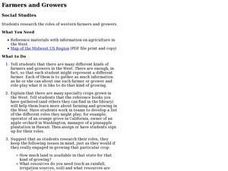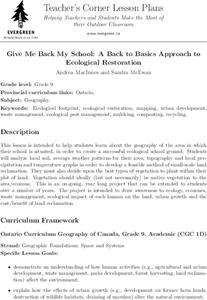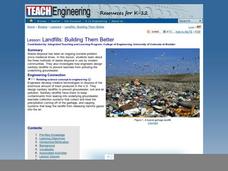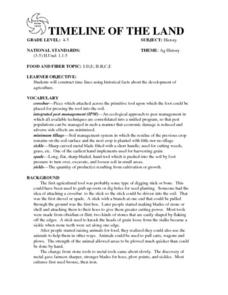Curated OER
Sludge
Learners become familiar with the idea that sludge is a waste product but can also be a resource, depending on its characteristics and how we manage it. They read information and answers questions on a worksheet imbedded in this plan.
Teach Engineering
Biological Processes: Putting Microbes to Work
Is there such a thing as useful microbes? Get ready to perform experiments on applying microbes for wastewater treatment. The first installment of the three-part unit provides background information to prepare young engineers for two...
NASA
Is It Alive?
Determining whether or not something is living can be more difficult than it seems. Put your young scientists to work defining their own criteria to identify life, then work with three samples to see if they are alive or...
Reading Resource
/oi/ Word List
Spoil, brown, poison. Designed to help develop phonemic awareness, the conscious awareness of the sound structure of words, readers are asked to identify and highlight the /oi/ sound in a list of 30 words. They then practice reading...
Curated OER
Farmers and Growers
Students explore the lives and work of the farmers and growers of specialty crops of the West. The amount of land and natural resources needed, the fertilizers utilized, and the market available for the crops are investigated in this...
Curated OER
Solid Waste Management
Sixth graders examine the role of packaging of everyday products and urge manufacturers to reduce the amount of it. They also discover how many products they use everyday can be recycled.
Curated OER
Examining Infiltration Rates of Various Soil Types
Students formulate their own hypothesis, determine which variables are important to test their hypothesis, design an experiment in which they collect data. They utilize instruments and tools to measure, calculate, and organize data.
Curated OER
Food Chains And Webs
Students investigate the concept of soil and all its components. They collect samples from a local site and transplant it into a terrarium. Students identify the organic elements, clay ,silt, and other forms of debris. They also identify...
Curated OER
Give Me Back My School: A Back to Basics Approach to Ecological Restoration
Ninth graders research local geography to create successful, ecological school landscaping. They determine soil type, average weather patterns and temperature graphs and use the information to select ideal plants and plant maintenance...
Curated OER
Horticulture Crops in the agro-ecosystem
Ninth graders apply ecological analysis to fruit and vegetable production systems. For this horticulture lesson students learn about different management practices.
Curated OER
Can You "Gas" What's Happening?
Students examine gas production in "soil" samples through hands on activities and class discussions, to determine if the soil samples have contain living or non-living systems.
Curated OER
Landfills: Building Them Better
Students investigate the three methods of waste disposal. They listen to a teacher-led lecture, answer discussion questions, and write a letter to the E.P.A. from the viewpoint of an environmental engineer.
Curated OER
Water, Water, Everywhere and Always on the Move
Middle schoolers create their own water cycle in a terrarium. In this water cycle lesson, students research the water cycle and complete a worksheet using the Internet. They create a water cycle of their own in a jar with stones, sand,...
Curated OER
Preparing for Drought
Learners study droughts in Oklahoma and list possible reasons for droughts. They form subcommittees to explore the drought problem and create plans for drought management and relief. They research five areas around the world where...
Curated OER
How Long Until Dirt
Third graders examine the difference between composting and wasting food. They problem-solve what to do about leftovers after lunches so good food doesn't go to waste.They study food storage techniques that are environmentally friendly...
Curated OER
Vermiculture Food Waste Compost Program for Touchstone School
Students explore the advantages of composting. In this recycling lesson students complete a worm compost project and collect food waste to feed them.
Curated OER
Look At A Landfill
Learners explore how landfills function. In this landfill lesson, students explore the use of landfills and the decomposition process by creating a model landfill. Learners discuss pros and cons to landfills and how potential problems...
Curated OER
TIMELINE OF THE LAND
Students construct time lines using historical facts about the development of agriculture. Students research specific dates and events and report their findings to the class. Students tape or glue the sections together sequentially in a...
Curated OER
Forests
Students examine soil in forests looking for animals and insects. They divide the animals based on their number of legs and draw the animal they have collected.
Curated OER
Water Quality Monitoring
Students comprehend the four parameters of water quality. They perform tests for salinity, dissolved oxygen, pH and clarity or turbidity. Students comprehend why scientists and environmental managers monitor water uality and aquatic...
Curated OER
The Rotten Truth
Students study the process of decomposition using lunch leftovers and soil. They complete the inquiry over set periods time as they observe the how composting takes place and finally, they sort the materials into biodegradable,...
Curated OER
Spinning the Eco Web
Students examine the components and relationships of ecoregions and ecosystem management. They define ecoregion and ecosystem, list ecoregions, and participate in a simulation that demonstrates the connections between parts of the...
Curated OER
Ecology of the Dump
Students recreate landfills in petri dishes, observe relative biodegradability in a year-long project, and isolate a cellulose degrading bacteria while discovering the need for recycling and the serious problem waste management has...
Curated OER
Crickets on the Hearth
Students investigate how crickets behave in cold temperatures. In this life science lesson, students explain the beneficial and harmful effect of pests. They research ways to properly manage them.

























